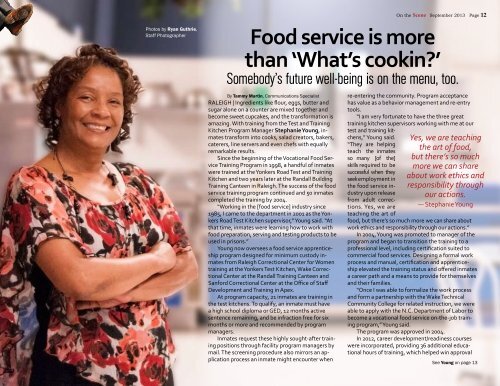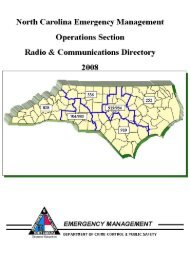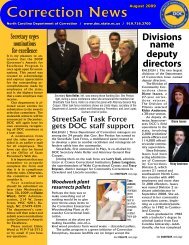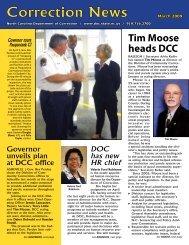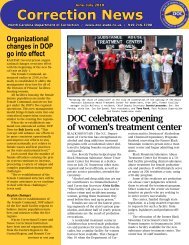S e p t e m b e r 2013
September - North Carolina Department of Public Safety
September - North Carolina Department of Public Safety
- No tags were found...
Create successful ePaper yourself
Turn your PDF publications into a flip-book with our unique Google optimized e-Paper software.
Photos by Ryan Guthrie,<br />
Staff Photographer<br />
Food service is more<br />
than ‘What’s cookin?’<br />
Somebody’s future well-being is on the menu, too.<br />
By Tammy Martin, Communications Specialist<br />
RALEIGH | Ingredients like flour, eggs, butter and<br />
sugar alone on a counter are mixed together and<br />
become sweet cupcakes, and the transformation is<br />
amazing. With training from the Test and Training<br />
Kitchen Program Manager Stephanie Young, inmates<br />
transform into cooks, salad creators, bakers,<br />
caterers, line servers and even chefs with equally<br />
remarkable results.<br />
Since the beginning of the Vocational Food Service<br />
Training Program in 1998, a handful of inmates<br />
were trained at the Yonkers Road Test and Training<br />
Kitchen and two years later at the Randall Building<br />
Training Canteen in Raleigh. The success of the food<br />
service training program continued and 50 inmates<br />
completed the training by 2004.<br />
“Working in the [food service] industry since<br />
1985, I came to the department in 2001 as the Yonkers<br />
Road Test Kitchen supervisor,” Young said. “At<br />
that time, inmates were learning how to work with<br />
food preparation, serving and testing products to be<br />
used in prisons.”<br />
Young now oversees a food service apprenticeship<br />
program designed for minimum custody inmates<br />
from Raleigh Correctional Center for Women<br />
training at the Yonkers Test Kitchen, Wake Correctional<br />
Center at the Randall Training Canteen and<br />
Sanford Correctional Center at the Office of Staff<br />
Development and Training in Apex.<br />
At program capacity, 21 inmates are training in<br />
the test kitchens. To qualify, an inmate must have<br />
a high school diploma or GED, 12 months active<br />
sentence remaining, and be infraction free for six<br />
months or more and recommended by program<br />
managers.<br />
Inmates request these highly sought-after training<br />
positions through facility program managers by<br />
mail. The screening procedure also mirrors an application<br />
process an inmate might encounter when<br />
re-entering the community. Program acceptance<br />
has value as a behavior management and re-entry<br />
tools.<br />
“I am very fortunate to have the three great<br />
training kitchen supervisors working with me at our<br />
test and training kitchens,”<br />
Young said.<br />
“They are helping<br />
teach the inmates<br />
so many [of the]<br />
skills required to be<br />
successful when they<br />
seek employment in<br />
the food service industry<br />
upon release<br />
from adult corrections.<br />
Yes, we are<br />
teaching the art of<br />
On the Scene September <strong>2013</strong> Page 12<br />
Yes, we are teaching<br />
the art of food,<br />
but there’s so much<br />
more we can share<br />
about work ethics and<br />
responsibility through<br />
our actions.<br />
— Stephanie Young<br />
food, but there’s so much more we can share about<br />
work ethics and responsibility through our actions.”<br />
In 2004, Young was promoted to manager of the<br />
program and began to transition the training to a<br />
professional level, including certification suited to<br />
commercial food services. Designing a formal work<br />
process and manual, certification and apprenticeship<br />
elevated the training status and offered inmates<br />
a career path and a means to provide for themselves<br />
and their families.<br />
“Once I was able to formalize the work process<br />
and form a partnership with the Wake Technical<br />
Community College for related instruction, we were<br />
able to apply with the N.C. Department of Labor to<br />
become a vocational food service on-the-job training<br />
program,” Young said.<br />
The program was approved in 2004.<br />
In 2012, career development/readiness courses<br />
were incorporated, providing 36 additional educational<br />
hours of training, which helped win approval<br />
See Young on page 13


